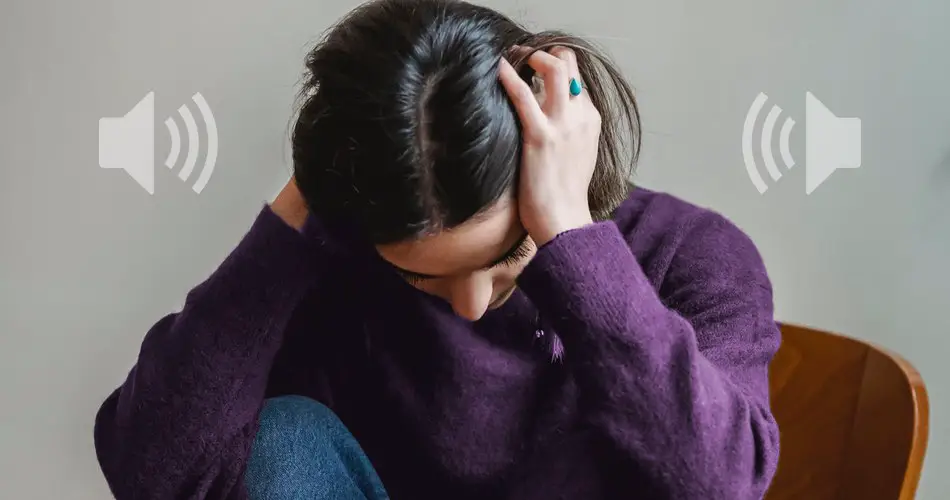With hyperacusis, sounds of normal volume (70-80 dB) are perceived as unpleasantly loud. Hyperacusis represents a subjective oversensitivity to noise. At higher levels (for example, when a car drives by), affected individuals react in a jumpy manner and report painful sensations in the ear and head.
As a result, sufferers often withdraw and try to avoid situations where higher sound levels are expected. Often, hearing protection is preferred even in normal situations. Hearing protection is important in very loud situations. However, when worn at a normal volume, there is an increased sensitivity to loudness. Hyperacusis becomes more severe when hearing protection is not worn.
In this article, you will learn about the possibilities and see a concrete example of how hearing aids can be used to bring the perception back to a normal tolerance of loudness. This approach can also be taken even though there is no hearing loss.
The central point is the consultation of the patient with hyperacusis. Here, the patient’s level of suffering is inquired about, possible causes are clarified and suitable therapeutic offers are made. The aim of the therapeutic offers is to reduce the level of suffering and to raise the threshold at which noises are perceived as unpleasant. The following options can be considered to deal with hyperacusis for example:
- Retraining therapy
- Hearing therapy
- Changing medications (ototoxic drugs)
Does Hyperacusis Get Better?
Hyperacusis can get better in combination with the correct therapy. When the cause of hyperacusis is certain medication taken by the patient the improvement can be quick when those medications can be switched. But when hyperacusis training is needed the improvement to tolerate louder sounds needs time. In most cases, the training goes on over months and in some cases even years.
Hyperacusis training is necessary for treatment to address the causes of hearing sensitivity to everyday sounds. Oftentimes The hearing care specialist or neurologist will educate the patient in detail about the causes of noise sensitivity. Oftentimes hearing aids can be used to make the hyperacusis better.
Because with hearing aids the volume in the ear can be controlled. It can be set to a certain level that can be tolerated by the wearer. Even when the wearer enters a very loud environment the hearing aids will be set to a certain amplification which will not be exceeded.
Over time this level of amplification can then be raised step by step so the wearer can tolerate louder sounds again. This is how hyperacusis can get better with the right training.
In this hyperacusis therapy, the patient is reintroduced and accustomed to everyday sounds. This approach works and oftentimes looks like this. In most cases, the person with hyperacusis can still tolerate a conversation in a room. Sounds during a conversation are usually as loud as 70 decibels. Then the person with hyperacusis gets fitted with hearing aids and those hearing aids will be set so they can not produce higher than the 70 decibels.

The ears will be fitted with a closed dome or a closed custom earpiece. This way sounds can not enter the ears directly in the ear canal. First, the environmental sounds will be processed by the hearing aids. This means when noises are louder than the threshold of 70 decibels they will be turned down to 70 decibels.
When a hearing loss is present in combination with hyperacusis this makes it possible to amplify sounds to a tolerable level that can not be heard without the hearing aids and lower the volume of sounds that are louder at the same time.
This makes hearing aids very powerful to make hyperacusis better even in combinations with tinnitus and hearing loss. The more those special devices are worn the more tolerable louder sounds become. But every patient has their own pace in which the volume and thresholds can be turned up until normal levels can be reached.
It is highly advised to seek professional help as soon as the sensitivity for noises builds up. Because the more the patient isolates himself and the fewer everyday sounds are tolerable for the patient the longer the retraining process becomes.
The patient should be able to deal with the noises in a more relaxed manner and thus regain some of his or her quality of life. Another component of hyperacusis therapy, as well as in tinnitus retraining therapy, is a noiser.
How Do You Desensitize Hyperacusis?
The noiser is a hearing aid that creates a background noise that is comfortable for the listener. Then louder environmental sounds are slowly added so that the brain learns to tune out the unimportant sounds. This process is called desensitization and can last several months or even more than one year.
Instead of hearing aids with a noiser program, other aids can provide relief through desensitization too. Simple things such as a room fountain, soft music, and nature sounds. It is important for people with hyperacusis to not stay in total silence. Those soft background noises create a relaxed environment in which daily sounds can be easier tolerated.
What Are the Symptoms of Hyperacusis?
Symptoms that people with hyperacusis exhibit are physical reactions to everyday noises, such as
- rapid heartbeat
- sensation of pain
- increased blood pressure
- sweating
- anxiety
- restlessness
- tension in the shoulder and neck area
Some are also plagued by tinnitus, which they sometimes have to fight for months or even years. Hyperacusis sufferers often live with a daily fear of loud noises and therefore also avoid public activities.
This oftentimes results in increased isolation and more ear protection. I met people with hyperacusis in my shop who wore ear muffs on top of earplugs.
As a result, the discomfort threshold to these environmental sounds dropped below 80 decibels. And sometimes even sounds like a running refrigerator become endearingly loud. This, of course, is stressful and leads to constant tensions, and makes it harder to relax.
Your hearing care specialist will do an examination of your ears and talk you through your options.
